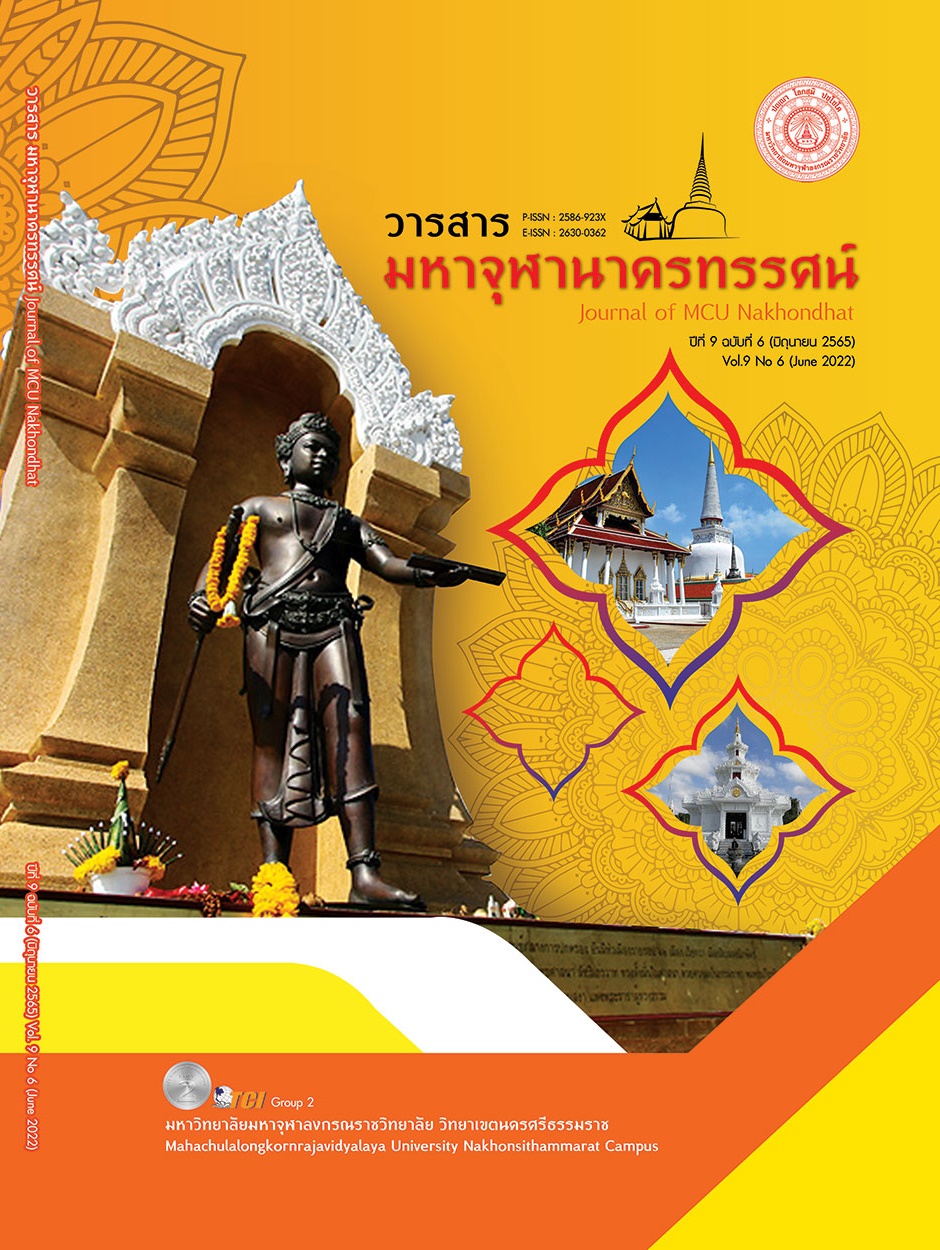THE DEVELOPMENT OF INSTRUCTIONAL PACKAGE USING CO-OP CO-OP LEARNING TECHNIQUES OF CURRICULUM DEVELOPMENT SUBJECT FOR MASTER OF EDUCATION PROGRAM IN CURRICULUM AND INSTRUCTIONAL STUDENTS AT PITCHAYABUNDIT COLLEGE
Main Article Content
Abstract
The objectives of this research article were to: 1) develop the effectiveness of an instructional package using Co-op Co-op learning techniques based on the criterion of 80/80, 2) study the students' learning progress who studied through an instructional package using Co-op Co-op learning techniques, 3) compare the students' learning achievement between before and after studying through an instructional package using Co-op Co-op learning techniques, and 4) study the students' satisfaction who studied through an instructional package using Co-op Co-op learning techniques. The research pattern used was the one group pretest-posttest design. The sample was drawn by using cluster random sampling totaling 33 students. The research instruments consisted of an instructional package using Co-op Co-op learning techniques, comprehension tests, and satisfaction questionnaires. Data were analyzed by mean, standard deviation, and t-test. The study found that: 1) an instructional packing using Co-op Co-op learning techniques was effective 82.13/85.10 as the defined criterion of 80/80; 2) the students who studied through an instructional package using Co-op Co-op learning techniques of 10 contents, had progressed in learning 5 contents at a medium level, and 5 contents at a high level; 3) The students' learning achievement after studying through an instructional package using Co-op Co-op learning techniques was higher than before at the .05 level of statistical significance; and 4) the students' satisfaction who studied through packing using Co-op Co-op learning techniques were at a high level of both a whole and every content.
Article Details

This work is licensed under a Creative Commons Attribution-NonCommercial-NoDerivatives 4.0 International License.
References
กรธวัฒน์ สกลคฤหเดช และคณะ. (2562). รูปแบบกิจกรรมการเรียนรู้แบบร่วมมือที่ส่งผลต่อผลสัมฤทธิ์ทางการศึกษาของนักศึกษาบริหารธุรกิจ. จันทรเกษมสาร, 25(2), 1-14.
กาญจนา ยลสิริธัม. (2557). ผลการจัดการเรียนแบบใฝ่รู้ด้วยเทคนิคการเรียนแบบร่วมมือที่มีผลต่อพฤติกรรมการเรียนรู้ ผลสัมฤทธิ์ทางการเรียน และความพึงพอใจในการเรียนรายวิชาคอมพิวเตอร์ สำหรับวิทยาศาสตร์ของนักศึกษาระดับปริญญาตรี มหาวิทยาลัยราชภัฏนครสวรรค์. วารสารวิทยาศาสตร์และเทคโนโลยี, 6(6): 53-58.
คณะศึกษาศาสตร์. (2562). หลักสูตรศึกษาศาสตรมหาบัณฑิต สาขาวิชาหลักสูตรและการสอนหลักสูตรใหม่ พ.ศ. 2562. หนองบัวลำภู: วิทยาลัยพิชญบัณฑิต.
งานทะเบียนและประมวลผล. (2563). รายงานผลสัมฤทธิ์ทางการเรียน ปีการศึกษา 2563. หนองบัวลำภู: วิทยาลัยพิชญบัณฑิต.
งานทะเบียนและประมวลผล. (2564). ข้อมูลจำนวนนักศึกษา ปีการศึกษา 2564. หนองบัวลำภู: วิทยาลัยพิชญบัณฑิต.
ชัยยงค์ พรหมวงศ์. (2551). การสร้างชุดการสอน: ชุดการสอน 2. เรียกใช้เมื่อ 9 กุมภาพันธ์ 2564 จาก https: //www.Ino-sawake. Blogsport.com
ชัยยงค์ พรหมวงศ์. (2556). การทดสอบประสิทธิภาพสื่อหรือชุดการสอน. วารสารศิลปากร ศึกษาศาสตร์, 5(3), 7-20.
ธีรภัทร์ สุขสบาย. (2561). การพัฒนาชุดการสอนรายวิชาการสอนการเรียนภาษาไทยสำหรับนิสิตปริญญาตรีชั้นปีที่ 4 คณะศึกษาศาสตร์ มหาวิทยาลัยบูรพา. วารสารบัณฑิตวิทยาลัยพิชญทรรศน์, 13(2), 115-125.
ธีระเดช จิราธนทัต. (2562). การพัฒนาผลสัมฤทธิ์ทางการเรียนและพฤติกรรมการตั้งใจเรียนของนักศึกษาโดยใช้ชุดการสอนที่เน้นวิธีการสอนแบบให้ฝึกปฏิบัติวิชาหลักการศึกษาและปรัชญาการศึกษา. วารสารศึกษาศาสตร์ มหาวิทยาลัยมหาสารคาม, 13(2), 161-172.
บุญชม ศรีสะอาด. (2560). การวิจัยเบื้องต้น. (พิมพ์ครั้งที่ 10). กรุงเทพมหานคร: สุวีริยาสาสน์.
พิมพันธ์ เตชะคุปต์. (2544). การเรียนการสอนที่เน้นผู้เรียนเป็นสำคัญ. กรุงเทพมหานคร: เดอะมาสเตอร์กรุ๊ฟแมเนจเม้นท์.
โยธิน ป้อมปราการ. (2558). รายงานผลการพัฒนาชุดการสอนวิชาอุปกรณ์และการออกแบบสำหรับนักศึกษา คณะเทคโนโลยีอุตสาหกรรม มหาวิทยาลัยราชภัฏกำแพงเพชร. วารสารชุมชนวิจัย มหาวิทยาลัยราชภัฏนครราชสีมา, 9(2), 79-88.
วรรณี แกมเกตุ. (2551). วิธีวิทยาการวิจัยทางพฤติกรรมศาสตร์. (พิมพ์ครั้งที่ 2). กรุงเทพมหานคร: โรงพิมพ์แห่งจุฬาลงกรณ์มหาวิทยาลัย.
สุรางค์ โคว้ตระกูล. (2553). จิตวิทยาการศึกษา (พิมพ์ครั้งที่ 9). กรุงเทพมหานคร: จุฬาลงกรณ์มหาวิทยาลัย.
Arends, R. I. (1994). Learning to teach. 3rded. New York: McGraw - Hill.
Bloom. (1976). Human Characteristics and school learning. New York: McGraw Hill. P.
Creamers, B. P. M. (1997). Toward a Theory of Education Effectiveness. Organizational Effectiveness and Improvement in Education. Wilshire: Redwood Books.
Hake, R. R. (1998). Interactive-engagement vs. traditional methods: A six – thousand – student survey of mechanics test data for introductory physics course. Am.J.Phys, 66( 1): 64-74.
Hergenhahn & Olson. (1993). A taxonomy of the psychomotor domain: A guide for developing behavioral objectives. New York: Longman.
Johnson, D. W. et al. (1994). The Nuts and Bolts of Cooperative Learning. Mines: Interaction Book Company.


